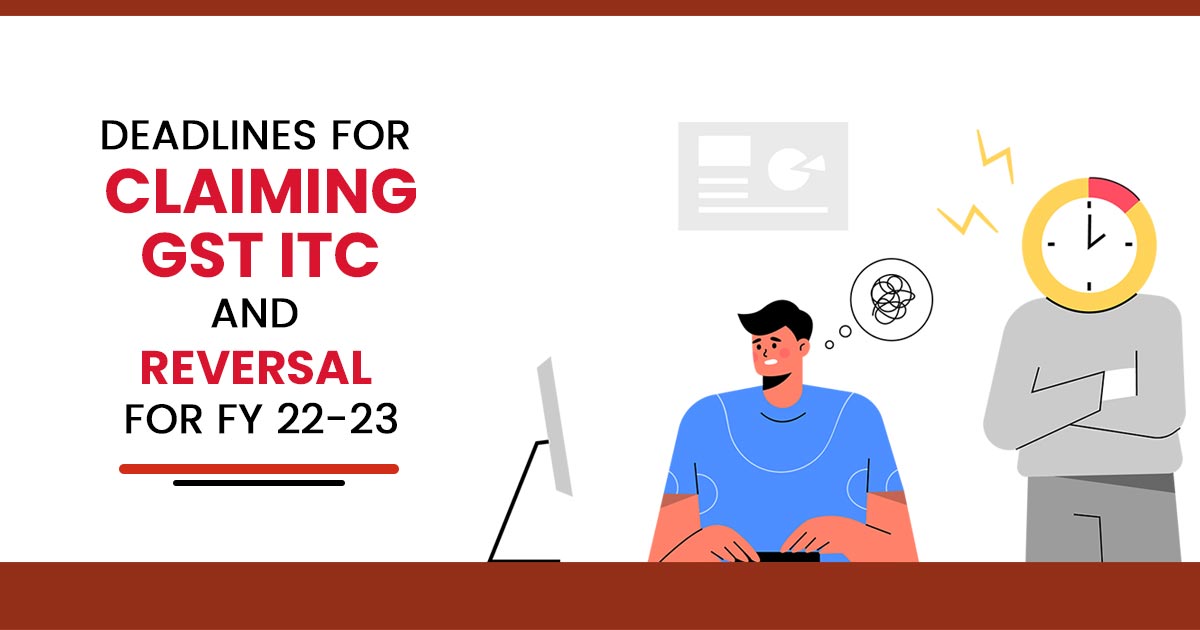
Input Tax Credit (ITC) serves as a taxation mechanism, allowing businesses to offset taxes paid on inputs against the taxes due on their output. Essentially, it permits businesses to claim a credit for taxes paid on purchases, thereby reducing their overall tax burden.
The limitations on Input Tax Credit (ITC) are detailed in GSTR-2B, Section 38. The revised timeline for claiming ITC on GST invoices or debit notes within a financial year is the earlier of two dates: November 30 of the subsequent year or the date of filing annual returns.
This implies that a taxpayer cannot claim ITC for invoices or debit notes relating to goods or services after November 30 following the financial year’s end or the filing of the pertinent annual return, whichever comes first.
With the approaching deadline of November 30, 2023, for the 2022-23 financial year, taxpayers must ensure adherence to GST regulations concerning Input Tax Credit (ITC). It’s pivotal to review and claim eligible ITC on invoices or debit notes before the specified deadline to comply with regulations and optimize tax advantages.
Needful Things to Do for ITC and Reversal Tax Credit
To align with the financial year 2022-23 deadline and uphold adherence to GST regulations regarding Input Tax Credit (ITC), taxpayers should promptly undertake the following actions:
Properly View GST Invoices and All Debit Notes
Examine and validate all invoices and debit notes related to goods or services
Determine eligible Input Tax Credit (ITC) by confirming that the invoices satisfy the requisite GST criteria
Accurate Reconciliation Between GST Returns and Books
- Compare the ITC availed in the GSTR 3B return from the ITC recorded in the accounting books of the company
- Ensure precision and compliance with GST rules through a thorough reconciliation procedure
Proper Record Keeping
- Along with the valid invoices and supporting documents maintain the proper documentation for the eligible Input tax credit claims
- Proper documents are required to prove the ITC’s claim legitimacy at the time of audits or assessments.
On-Time GST Return Filing
- Ensure prompt submission of all pending GST returns, both regular and annual, to maintain compliance
- Timely filing is essential to secure Input Tax Credit claims and prevent penalties for late submissions
Quickly Resolve Any Problem
- Promptly rectify any discrepancies or errors found in past filings for accuracy and adherence to regulations
- Maximize eligible Input Tax Credit claims while reversing any ineligible claims to guarantee precise and compliant filings
Connect with Suppliers
- Establish communication channels with suppliers to resolve issues pertinent to missing or incorrect invoices promptly
- Obtain essential documents from suppliers to support Input Tax Credit claims and uphold seamless transaction processes
Examine GSTR-2B Data
- Verify the GSTR-2B data and compare the same with the purchase register
- Address any issues between GSTR-2B and the purchase register to prevent ITC claim problems
Ineligible Items for Input Tax Credit Claims Under GST
Input Tax Credit (ITC) is not permitted on:
- Services pertinent to motor vehicle maintenance, insurance, and repair
- Particular categories such as food, beverages, catering, beauty treatment, health services, and cosmetic surgery, unless part of a composite supply
- Clubs, health/fitness centres memberships
- Rent-a-cab, health & life insurance, until mandated by law or part of a composite supply
- Leasing/hiring of vehicles, vessels, or aircraft, except in certain cases
- Travel advantages for employees on vacation
- Works contract services for immovable property construction
- Goods/services for personal use
- Goods/services under the GST composition scheme
- Non-resident taxable person’s transactions
- Goods lost, stolen, destroyed, or disposed of without consideration
- ITC is not available when the tax is paid due to fraud or willful misstatements etc